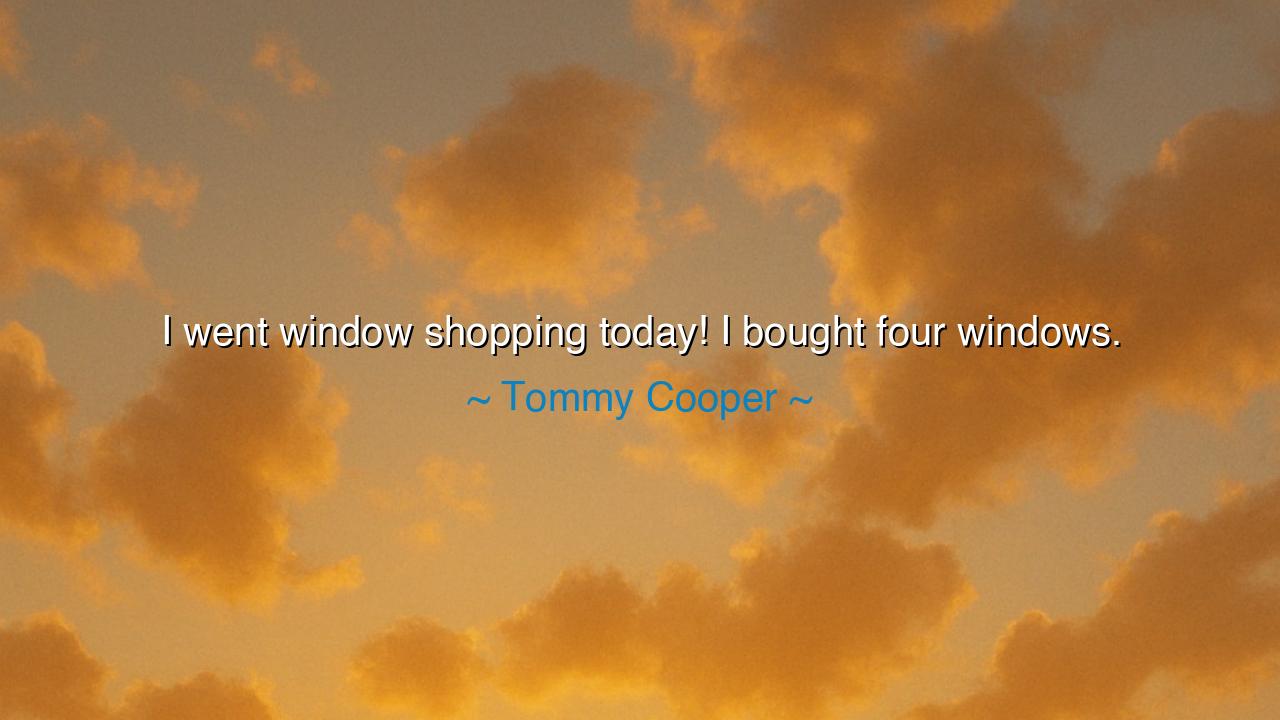
I went window shopping today! I bought four windows.






“I went window shopping today! I bought four windows.” — in this brief yet radiant jest, Tommy Cooper, the British master of absurd humor, distills a truth that lies at the heart of both comedy and wisdom: that perspective is everything, and that the world, when seen through laughter, reveals its gentle paradoxes. His humor, simple in words yet profound in implication, turns an everyday idiom — window shopping — into a literal act, collapsing the boundary between meaning and misunderstanding. And in doing so, Cooper reminds us that life itself is full of such misinterpretations, and that those who can laugh at them hold a kind of secret strength.
On its surface, the line is pure comedy — the delight of taking a familiar phrase and flipping it inside out. “Window shopping” means to browse, to look without buying; but Cooper’s playful mind transforms the metaphor into a concrete act of innocent folly. This sudden shift — from abstraction to literalness — is what makes the joke bloom. Yet beneath the laughter, there lies the whisper of something deeper: that human beings are forever caught between what is said and what is meant, between the surface of words and the world beneath them. Cooper’s humor reveals not confusion, but clarity through absurdity — a reminder that taking life too seriously blinds us to its joyful nonsense.
In the tradition of the ancients, humor was never far from philosophy. The wise understood that jest can reveal truths that solemn speech cannot. Diogenes of Sinope, the Cynic philosopher, once carried a lantern in broad daylight, claiming he was “looking for an honest man.” Like Cooper, he used absurdity to expose reality. Where others saw only laughter, Diogenes offered a mirror to human folly — just as Cooper does in his line about buying windows. Beneath the jest is a critique of our habits: our endless browsing through life, our hesitation to commit, our comfort in observing rather than acting. By “buying four windows,” Cooper mocks this passivity — he transforms intention into action, even if through the most illogical means.
In this way, the quote can be read as a parable of engagement. Many spend their lives as window shoppers — gazing longingly at possibilities, dreams, and desires, but never stepping beyond the glass. Cooper’s humor, though born of jest, carries an unintended wisdom: better to act foolishly than to never act at all. His purchase of “four windows” becomes a metaphor for courage — for participation in life’s theater, even if one stumbles in the process. It is as if he is saying, “If you must err, err in doing, not in hesitating.”
There is also tenderness in his absurdity. In laughing at himself, Cooper liberates us from the tyranny of perfection. The man who can jest about buying windows teaches that self-awareness is lighter when carried with humor. We all make mistakes, misunderstand, or act in ways that defy logic. But rather than despair, Cooper shows us how to smile — how to see the comedy in confusion and the grace in imperfection. His humor is the laughter of compassion: the kind that does not wound, but heals.
We might recall the life of Albert Einstein, who, though a genius of science, once said, “If at first the idea is not absurd, then there is no hope for it.” Like Cooper, Einstein recognized that absurdity is often the seed of insight. The boundary between humor and revelation is thin; sometimes, the most foolish statement hides the wisest truth. Cooper’s windows, bought in jest, become symbolic — openings through which light and perspective can enter the soul.
The lesson, then, is both joyous and profound: do not be afraid to misunderstand, to laugh, or to play with meaning. In humor lies humility, and in humility lies wisdom. When you find yourself “window shopping” through life — admiring possibilities but never daring to choose — remember Cooper’s laughter. Buy the windows. Make the leap from looking to living. Even if the world finds your act absurd, your courage will fill your heart with light.
So remember, O seeker of truth — life’s greatest teachers often speak in laughter. The wise fool and the joyful sage share a common tongue. As Tommy Cooper teaches through his simple jest, clarity sometimes arrives wrapped in absurdity, and wisdom often wears the mask of mirth. So go, laugh freely, act boldly, and do not fear being misunderstood — for in the end, it is through laughter that the soul learns to see the world anew.






AAdministratorAdministrator
Welcome, honored guests. Please leave a comment, we will respond soon